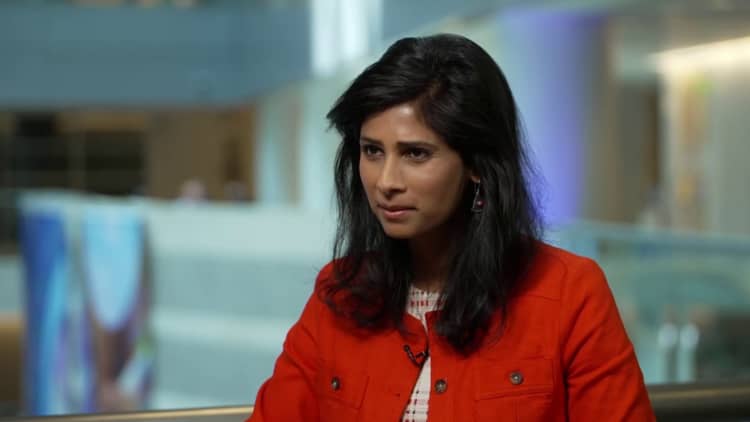One of the International Monetary Fund’s top economists signals little risk of a global recession, despite the ongoing rumblings of geopolitical uncertainty.
The Washington DC-based institute this week nudged its global growth outlook slightly higher to 3.2% in 2024 and projects the same rate in 2025.
“When we do the risk assessment around that baseline, the chances that we would have something like a global recession is fairly minimal. At this point, it will take a lot to derail this economy. So there has been tremendous resilience in terms of growth prospects,” Pierre-Olivier Gourinchas, economic counsellor and director of the research department at the IMF, told CNBC’s Karen Tso on Tuesday at the group’s meeting in New York.
The “set of good news” includes strong economic performance by the U.S. and several emerging market economies, along with inflation falling faster than expected until recently despite weaker growth in Europe, Gourinchas said.

There is divergence within Europe, he added, with the IMF downgrading its growth forecasts for Germany, France and Italy, but taking them higher for Spain, Portugal, Belgium and the U.K.
Growth forecasts since fall last year have had to factor in increased geopolitical instability, with tensions in the Middle East looming over the oil market, while Israel’s war with Palestinian militant group Hamas in the Gaza Strip led to disruptions in shipping routes in the Red Sea, by way of maritime attacks from Yemeni Houthis. That has all combined with the ongoing Russia-Ukraine war, which had its biggest wider impact on energy prices in Europe in 2022.
Oil prices increasing significantly and persistently throughout 2024 and further disruption to shipments between Asia and Europe would fuel inflation in 2024, Gourinchas noted, which would then cause central banks to hold rates higher for longer and weigh on global growth.
Economic Counsellor and Director of the Research Department Pierre-Olivier Gourinchas makes a statement during the presentation of the World Economic Outlook at the International Monetary Fund during the 2024 Spring Meetings of the International Monetary Fund (IMF) and the World Bank Group in Washington DC, United States on April 16, 2024.
Celal Gunes | Anadolu | Getty Images
By the IMF’s estimate, a consistent rise in oil prices of around 15% in 2024 would push up global inflation by around 0.7%, though the value of the commodity has so far proved relatively stable even through the recent spike in Israel-Iran tensions.
Despite the positivity of the latest forecast, Gita Gopinath, the IMF’s deputy managing director, told CNBC on Tuesday she assessed geopolitical risks as a “big concern.”
“We have somehow managed the situation so far, and we’re not seeing big spillovers from the Middle East. But that is not a given. And that’s one of the big risks that we do see, the implications that could have for oil prices could be substantial. If the conflict were to escalate, become much bigger conflict,” she said.







